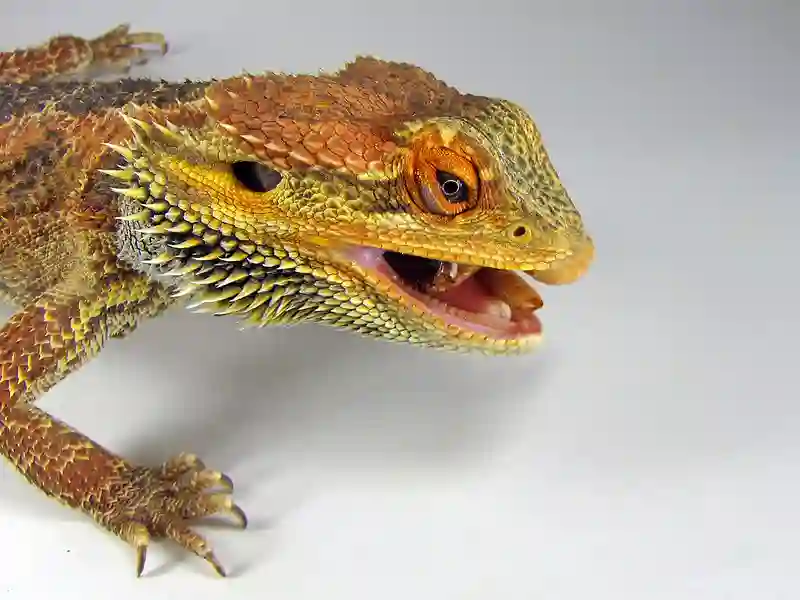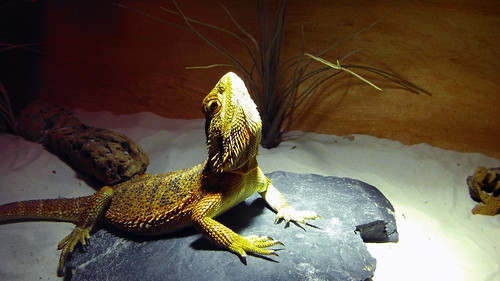Do you own a bearded dragon? If so, you’ll want to know what they hate.
Bearded dragons are usually calm and docile creatures, but there are certain things that they tend to dislike or even actively avoid.
This article will look at some of the common things that bearded dragons don’t like and how you can make sure your pet is as comfortable and content as possible.
From loud noises to sudden movement, bright lights to strong smells, there are plenty of things that your beloved reptilian friend doesn’t enjoy – let’s take a closer look!
Loud Noises
You don’t want to be around a bearded dragon when it’s exposed to loud noises; they absolutely hate it!
Bearded dragons are sensitive creatures, so being exposed to any kind of noise that is too loud can cause them a great deal of stress and agitation.
If there is an unexpected loud sound or noise in their environment, such as a door slamming or the vacuum cleaner running, your dragon will likely run for cover and try to find a safe place away from the noise.
Over time, you may notice that they become accustomed to certain everyday sounds, but even then it’s important to keep the volume low and not overwhelm them with excessive noise.
Sudden Movement
Sudden movements can startle them, so it’s best to keep things slow and steady. Bearded dragons have highly sensitive eyesight, and sudden movements can trigger their defense mechanisms, causing them to flee or become extremely agitated.
When you interact with your bearded dragon, be mindful of the speed with which you approach and move around them. Here are 4 tips for keeping your bearded dragon calm in regard to sudden movement:
- Approach slowly from an angle they can perceive without startling them.
- Move slowly when interacting with the bearded dragon.
- Avoid any sudden movements that might scare them.
- Give them time to adjust to their surroundings before moving around too quickly.
Bright Lights
Bearded dragons are sensitive to bright lights, so it’s important to keep their habitats well-lit but not overly illuminated. Too much light can cause them anxiety and discomfort, as their eyes are very sensitive and they prefer a dimmer atmosphere.
Bearded dragons need around 10-12 hours of daytime lighting, which should mimic the natural sunlight in their native habitats. It’s important to research the type of light that is best for your bearded dragon and find one that replicates the same temperature, spectrum, and intensity as natural sunlight.
Also, be sure to place the light at an appropriate distance from your pet in order for them to stay comfortable while basking in the sun.
Strong Smells
Strong odors can be a source of distress for bearded dragons, as their sense of smell is very acute and easily overwhelmed. The olfactory organ in bearded dragons is extremely sensitive. These reptiles will avoid any strong smells that could be potentially dangerous to them.
For example, if your bearded dragon senses the scent of predators nearby or something else that it perceives as a threat, it will immediately become stressed. Bearded dragons also hate strong-scented perfumes and fragrances, which may make them feel uncomfortable.
To keep your pet happy and healthy, it’s important to minimize potential sources of strong odors when you are around your pet so they don’t become overwhelmed by unpleasant smells.
Unfamiliar Objects
Bearded dragons don’t usually take kindly to unfamiliar objects, so it’s best to introduce them gradually. This can help the dragon become more familiar and comfortable with its surroundings.
Unfamiliar items can cause stress and anxiety for bearded dragons, so it is important to limit their exposure to unknown objects. It is recommended that you place any new objects near your beardie’s habitat but not within reach of the dragon itself.
Slowly move the object closer over a few days or weeks until the dragon becomes accustomed to its presence. Once they become more comfortable, you can let them explore and interact with it on their own terms.
Being Touched Unnecessarily
Moving on from unfamiliar objects, another thing that bearded dragons might dislike is being touched unnecessarily. In general, they don’t enjoy being handled and can become stressed if it happens too often. For this reason, it’s important not to handle them more than necessary and to be gentle when you do.
Additionally, a bearded dragon may see handling as a threat and respond aggressively by puffing up its beard or hissing at you. To avoid any unpleasant reactions like this, always give your pet plenty of space and don’t surprise them with sudden movements.
Being Handled Invasively
When it comes to being handled invasively, bearded dragons don’t appreciate it and may respond with aggression. Unnecessary touching, handling, or holding of the dragon can make them feel scared or threatened, and they’ll likely react defensively.
This can result in a number of uncomfortable situations for both the dragon and its handler. They might try to bite you in self-defense. They could urinate out of fear as a way to mark their territory and express displeasure.
Your bearded dragon may puff up its beard in an attempt to appear larger than it is as a warning sign that it feels threatened. It may also become very still as if trying to hide from the perceived danger, showing signs of distress such as panting or hissing noises when picked up too often or without proper care.
It’s important not to handle your bearded dragon too much. Familiarize yourself with its body language so you know when it’s feeling stressed or scared, and give it plenty of space so that it doesn’t become agitated by unwanted contact.
Being Confined to Small Spaces
Living in a cramped, enclosed environment can make bearded dragons feel uncomfortable and anxious. Not only is this type of space too small for the dragon to move around freely, but it also creates an unsettling atmosphere. Bearded dragons need to be able to explore their surroundings and have plenty of room to roam.
This is especially important if they’re living with other bearded dragons or other types of animals in the same space. By not having enough room, these lizards could easily become stressed out, which can lead to health complications and even death.
It’s therefore essential that you provide a spacious living area for your bearded dragon so that it can thrive in its natural habitat as much as possible.
Being Exposed to Extreme Temperatures
Bearded dragons can’t cope well with extreme temperatures, so it’s important to maintain a consistent environment that isn’t too hot or too cold for them.
While they’re native to deserts and require some heat, they shouldn’t be exposed to temperatures above 95°F (35°C).
On the other hand, temperatures below 75°F (24°C) can also cause distress as their bodies struggle to generate enough energy in the cooler environment.
The ideal range for bearded dragons is between 80-90°F (27-32°C), with a basking area reaching up to 95°F (35°C).
To ensure their safety and happiness, provide your bearded dragon with an appropriate habitat where you can monitor both humidity and temperature.
Being Exposed to Predators
In the wild, bearded dragons must constantly be on the lookout for potential predators that could threaten their lives. They’re always at risk of being preyed upon by larger animals such as foxes, cats, and birds of prey. Even lizards like monitor lizards have been known to hunt and consume smaller bearded dragons.
The threat of predation is a constant source of stress for them and can cause them immense anxiety if they feel threatened or unsafe in their environment. Therefore, it’s important to provide them with a secure habitat that’s free from potential predators that could harm them.


